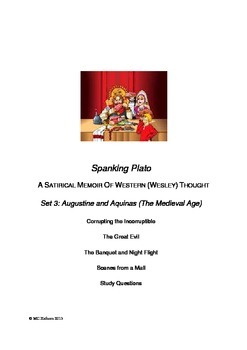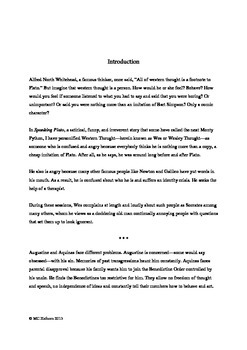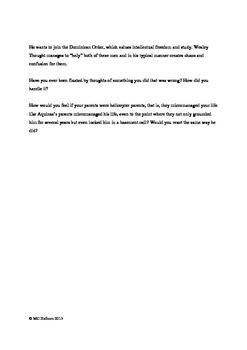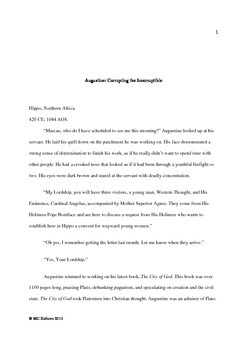Spanking Plato: Set 3: Augustine and Aquinas
mel hathorn
58 Followers
Grade Levels
10th - 12th, Higher Education
Resource Type
Formats Included
- PDF
Pages
30 pages
mel hathorn
58 Followers
Description
Introduction
Alfred North Whitehead, a famous thinker, once said, “All of western thought is a footnote to Plato.” But imagine that western thought is a person. How would he or she feel? Behave? How would you feel if someone listened to what you had to say and said that you were boring? Or unimportant? Or said you were nothing more than an imitation of Bart Simpson? Only a comic character?
In Spanking Plato, a satirical, funny, and irreverent story that some have called the next Monty Python, I have personified Western Thought—herein known as Wes or Wesley Thought—as someone who is confused and angry because everybody thinks he is nothing more than a copy, a cheap imitation of Plato. After all, as he says, he was around long before and after Plato.
He also is angry because many other famous people like Newton and Galileo have put words in his mouth. As a result, he is confused about who he is and suffers an identity crisis. He seeks the help of a therapist.
During these sessions, Wes complains at length and loudly about such people as Socrates among many others, whom he views as a doddering old man continually annoying people with questions that set them up to look ignorant.
* * *
Have you ever met someone who tries to be helpful to you but ends up screwing up your life? Perhaps this person is well meaning, but embarrasses you. Perhaps this person blurts out a secret you told him or her to all of your friends. Perhaps this person gets you in trouble unintentionally setting you up or making you look bad.
Wesley Thought meets Augustine and corrupts him by unintentionally mishandling Augustine’s greatest weakness. He also meets Aquinas and this time does something helpful; he saves Aquinas from a horrible fate.
Learner’s Guide: Augustine and Aquinas
Critical Thinking questions:
1. Augustine was concerned about sin. Is there such a thing as sin? What is it? What is the difference between a sin and a crime? Is every crime a sin? Is every sin a crime? How would you determine someone’s guilt or innocence of a sin? A crime? Give examples.
2. Should the punishment for a sin or a crime be different? Why? Who should be the punisher? On whom does the blame for the transgression fall?
3. Were Augustine’s youthful transgressions a sin? Why or why not?
4. Adults and adolescents commit many crimes; some are minor and some are serious. Consider the rash of shootings of innocent victims over the last few years. Why do you think these are happening? Many times these crimes are random, done with out a reason. Should society handle crimes differently if a mentally disturbed person does them?
5. In the reading on Augustine, we saw that there are two views of evil. What are the differences between them? To which do you subscribe? Why?
6. In the mall scene, Wesley explains that he has trouble believing in the existence of God. His disbelief is not due to the usual arguments i.e. the presence of bad weather, disease, etc. but that God allows others to besmirch his name and claim to speak for God. Thought believes that in the Old Testament, God would have struck these blasphemers down. That God allows these people to get away with their blasphemy is enough reason to doubt God’s existence. What do you think? Is this a legitimate reason to doubt God’s existence?
7. Why do some people, especially celebrities like movie stars, politicians, and sports personalities, engage in self-destructive behavior like drugs, bribes, and alcohol? Is this addictive behavior or behavior that one freely engages in?
8. If Augustine is right and evil is the absence of good, how can we bring out the good in society and in others? Do you know any truly good people? Any evil people?
9. Research or discuss: is a person’s behavior sin, crime, or good deeds, determined by his or her environment or by his or her genetics? In other words, is nature (genetics) or nurture (environmental influences) the cause of one’s behavior?
Alfred North Whitehead, a famous thinker, once said, “All of western thought is a footnote to Plato.” But imagine that western thought is a person. How would he or she feel? Behave? How would you feel if someone listened to what you had to say and said that you were boring? Or unimportant? Or said you were nothing more than an imitation of Bart Simpson? Only a comic character?
In Spanking Plato, a satirical, funny, and irreverent story that some have called the next Monty Python, I have personified Western Thought—herein known as Wes or Wesley Thought—as someone who is confused and angry because everybody thinks he is nothing more than a copy, a cheap imitation of Plato. After all, as he says, he was around long before and after Plato.
He also is angry because many other famous people like Newton and Galileo have put words in his mouth. As a result, he is confused about who he is and suffers an identity crisis. He seeks the help of a therapist.
During these sessions, Wes complains at length and loudly about such people as Socrates among many others, whom he views as a doddering old man continually annoying people with questions that set them up to look ignorant.
* * *
Have you ever met someone who tries to be helpful to you but ends up screwing up your life? Perhaps this person is well meaning, but embarrasses you. Perhaps this person blurts out a secret you told him or her to all of your friends. Perhaps this person gets you in trouble unintentionally setting you up or making you look bad.
Wesley Thought meets Augustine and corrupts him by unintentionally mishandling Augustine’s greatest weakness. He also meets Aquinas and this time does something helpful; he saves Aquinas from a horrible fate.
Learner’s Guide: Augustine and Aquinas
Critical Thinking questions:
1. Augustine was concerned about sin. Is there such a thing as sin? What is it? What is the difference between a sin and a crime? Is every crime a sin? Is every sin a crime? How would you determine someone’s guilt or innocence of a sin? A crime? Give examples.
2. Should the punishment for a sin or a crime be different? Why? Who should be the punisher? On whom does the blame for the transgression fall?
3. Were Augustine’s youthful transgressions a sin? Why or why not?
4. Adults and adolescents commit many crimes; some are minor and some are serious. Consider the rash of shootings of innocent victims over the last few years. Why do you think these are happening? Many times these crimes are random, done with out a reason. Should society handle crimes differently if a mentally disturbed person does them?
5. In the reading on Augustine, we saw that there are two views of evil. What are the differences between them? To which do you subscribe? Why?
6. In the mall scene, Wesley explains that he has trouble believing in the existence of God. His disbelief is not due to the usual arguments i.e. the presence of bad weather, disease, etc. but that God allows others to besmirch his name and claim to speak for God. Thought believes that in the Old Testament, God would have struck these blasphemers down. That God allows these people to get away with their blasphemy is enough reason to doubt God’s existence. What do you think? Is this a legitimate reason to doubt God’s existence?
7. Why do some people, especially celebrities like movie stars, politicians, and sports personalities, engage in self-destructive behavior like drugs, bribes, and alcohol? Is this addictive behavior or behavior that one freely engages in?
8. If Augustine is right and evil is the absence of good, how can we bring out the good in society and in others? Do you know any truly good people? Any evil people?
9. Research or discuss: is a person’s behavior sin, crime, or good deeds, determined by his or her environment or by his or her genetics? In other words, is nature (genetics) or nurture (environmental influences) the cause of one’s behavior?
Total Pages
30 pages
Answer Key
N/A
Teaching Duration
N/A
Report this resource to TPT
Reported resources will be reviewed by our team. Report this resource to let us know if this resource violates TPT’s content guidelines.





